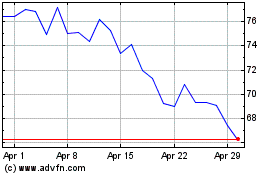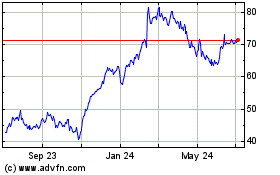Uber Ridership Fails to Recover as Pandemic Drives Another Big Loss
August 06 2020 - 4:36PM
Dow Jones News
By Preetika Rana
Uber Technologies Inc. posted another big loss with little sign
of recovery in its core ride-hailing business as the coronavirus
pandemic drags on.
Gross bookings for Uber's rides plunged 75% year-over-year in
the three months ended June 30, the San Francisco-based company
said Thursday, With the entire second quarter affected by the
Covid-19 outbreak, bookings fell 72% from the first quarter when
the pandemic first struck.
Uber Chief Executive Dara Khosrowshahi in May said there were
early signs of recovery in ridership as some jurisdictions were
easing shelter-in-place measures. But rising Covid-19 infection
rates have hit that recovery, keeping ridership subdued.
Total quarterly revenue fell 29% to $2.24 billion from $3.17
billion in the year-ago period. Overall gross bookings, including
Uber's food delivery business and other operations, declined 35%
year-over-year to $10.22 billion. The results were broadly in line
with Wall Street's already muted expectations. Analysts surveyed by
FactSet had forecast revenue at $2.08 billion and gross bookings at
$10.53 billion.
Uber posted a $1.8 billion net loss, far smaller than the year
ago period when one-time costs from its initial public offering
drove its largest-ever three-month loss. Stripping out one-time
costs, its second-quarter adjusted loss before interest, taxes,
depreciation and amortization widened in the most recent June
quarter to $837 million compared with a $656 million adjusted loss
in the year-ago period.
Mr. Khosrowshahi had vowed to make Uber profitable on an
adjusted Ebitda basis before the end of the year, but withdrew that
forecast in April because of the health crisis. On Thursday, the
company reaffirmed its hope to reach that milestone next year. Uber
introduced a host of measures in May to save more than $1 billion
in fixed costs, including far-reaching job cuts. The company booked
$382 million in restructuring costs in the second quarter linked to
its efforts to become leaner.
The rides segment, despite plummeting ridership, remained
profitable on an adjusted basis, signally the company's decision
before the pandemic to focus on profitable growth after years of
losses is showing results.
Uber's food-delivery business has been a bright spot during the
pandemic, with people stuck at home. Bookings more than doubled
year over year and advanced 49% over the first quarter. "As some
people stay closer to home, more people are ordering from Uber Eats
than ever before," Mr. Khosrowshahi said.
The Eats segment lost $232 million in the quarter on an adjusted
basis in the cutthroat food-delivery market where profit has
largely been elusive. Uber has tried to trim those losses, and the
second-quarter results were the best three-month performance for
its Eats business.
Last month, Uber agreed to acquire rival Postmates Inc. in a
tie-up that would allow the company to find savings amid the costly
work of building out a delivery empire and to compete with
deep-pocketed rivals. The $2.65 billion all-stock deal is expected
to close next year. Uber was vying to buy Grubhub Inc., but was
beat out by Dutch food-delivery giant Just Eat Takeaway.com NV in a
$7 billion deal.
Falling ridership during the pandemic and fierce competition in
its food-delivery business aren't Uber's only headaches. Regulators
also have Uber and other so-called gig-economy companies in their
crosshairs for allegedly misclassifying their workers as
independent contractors instead of employees.
On Wednesday, California's Labor Commission said it was suing
Uber and rival Lyft Inc. for misclassifying their drivers in that
way. The state's new gig-economy law, which took effect Jan. 1,
seeks to force the companies to classify drivers as employees,
making them eligible for benefits such as paid sick leave and
health insurance -- issues that became front-and-center during the
pandemic.
Uber and Lyft have said their drivers are properly classified
under the law. Still, the ride-hailing companies have joined other
startups that rely on gig workers and raised more than $110 million
to back a ballot initiative for November, asking that voters exempt
them from the law.
Write to Preetika Rana at preetika.rana@wsj.com
(END) Dow Jones Newswires
August 06, 2020 16:21 ET (20:21 GMT)
Copyright (c) 2020 Dow Jones & Company, Inc.
Uber Technologies (NYSE:UBER)
Historical Stock Chart
From Mar 2024 to Apr 2024

Uber Technologies (NYSE:UBER)
Historical Stock Chart
From Apr 2023 to Apr 2024
